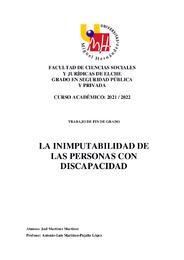Por favor, use este identificador para citar o enlazar este ítem:
https://hdl.handle.net/11000/28317Registro completo de metadatos
| Campo DC | Valor | Lengua/Idioma |
|---|---|---|
| dc.contributor.advisor | Martínez-Pujalte López, Antonio Luis | - |
| dc.contributor.author | Martínez Martínez, Joel | - |
| dc.contributor.other | Departamentos de la UMH::Ciencia Jurídica | es_ES |
| dc.date.accessioned | 2022-11-10T07:51:12Z | - |
| dc.date.available | 2022-11-10T07:51:12Z | - |
| dc.date.created | 2022-06-07 | - |
| dc.identifier.uri | https://hdl.handle.net/11000/28317 | - |
| dc.description.abstract | La Convención Internacional de los derechos de las personas con discapacidad ha promovido en su artículo 12 la capacidad de jurídica de éstas; y ha provocado que en nuestro derecho interno se publique la derogación de la inhabilitación en la Ley 8/2021, regulando en sustitución las medidas de apoyo. Dicha ley es un instrumento legislativo idóneo para que las condiciones de igualdad de todos los derechos humanos y libertades fundamentales de todas las personas con discapacidad se puedan ejercer sin ningún menoscabo. En este trabajo explico cómo una persona con discapacidad, manteniendo su capacidad jurídica, puede resultar una persona inimputable a nivel penal, siempre y cuando se den las condiciones para ello, pero además también puede resultar semi imputable; pudiendo ser ambas figuras el origen de imposición de medidas de seguridad para las personas que hayan cometido un delito y tengan ciertos elementos en su personalidad que muestren una peligrosidad delictiva. A su vez también pongo de manifiesto de una manera más breve, pero no por ello menos importante, la necesidad de creación de más centros de educación especial y la formación del personal Policial, de la administración de justicia, del personal penitenciario, y en definitiva, de todos los agentes participantes en el proceso penal. | es_ES |
| dc.description.abstract | Article 12 of the International Convention on the Rights of Persons with Disabilities has promoted their legal capacity; and it has caused the repeal of the derogation of Law 8/2021 to be published in our internal law, regulating the support measures in substitution. Said law is an ideal legislative instrument so that the conditions of equality of all human rights and fundamental freedoms of all persons with disabilities can be ensured without any undermining. End od degree proyect I explain how a person with a disability, maintaining their legal capacity at all times, can be a person who cannot be criminally charged, as long as the necessary conditions are met; and it can also be semi attributable; both figures being able to generate the imposition of security measures when a crime is committed and there are certain elements of their personality that show criminal dangerousness. At the same time, I also highlight in a shorter, but not less important, the need to create more special education centers and the training of Police personnel, the administration of justice, prison personnel, and ultimately , of all the agents participating in the criminal process. | es_ES |
| dc.format | application/pdf | es_ES |
| dc.format.extent | 36 | es_ES |
| dc.language.iso | spa | es_ES |
| dc.publisher | Universidad Miguel Hernández de Elche | es_ES |
| dc.rights | info:eu-repo/semantics/openAccess | es_ES |
| dc.rights | Attribution-NonCommercial-NoDerivatives 4.0 Internacional | * |
| dc.rights.uri | http://creativecommons.org/licenses/by-nc-nd/4.0/ | * |
| dc.subject | inimputabilidad | es_ES |
| dc.subject | discapacidad | es_ES |
| dc.subject | capacidad jurídica | es_ES |
| dc.subject | derechos fundamentales | es_ES |
| dc.subject.other | CDU::3 - Ciencias sociales::34 - Derecho::343 - Derecho penal. Delitos | es_ES |
| dc.title | La inimputabilidad de las personas con discapacidad | es_ES |
| dc.type | info:eu-repo/semantics/bachelorThesis | es_ES |

Ver/Abrir:
SEPP_TFG_MARTINEZ_MARTINEZ_JOEL.pdf
756,42 kB
Adobe PDF
Compartir:
 La licencia se describe como: Atribución-NonComercial-NoDerivada 4.0 Internacional.
La licencia se describe como: Atribución-NonComercial-NoDerivada 4.0 Internacional.
.png)